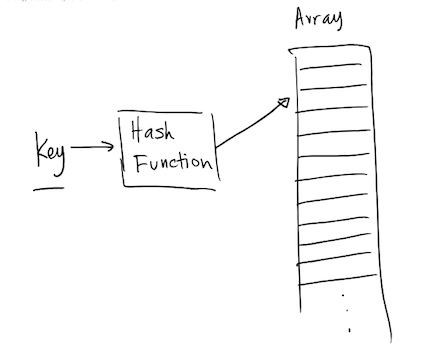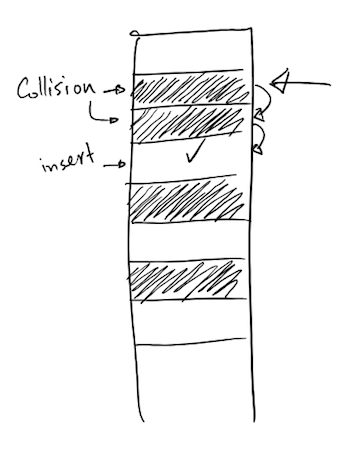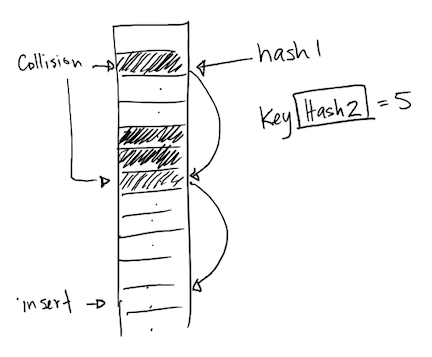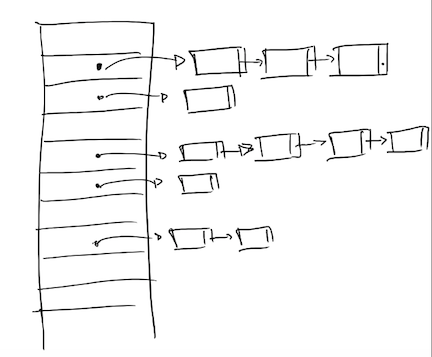| Previous Lecture | Lecture 6 | Next Lecture |
Lecture 6, Tue 10/16
Hashing
Hashing
- The ability to address unique key values in an array whose size may be smaller than the set of possible key values.
- Generally, keys are unique values that identify some record of information.
- In order to put data (value) in the appropriate place in the collection, a hash function is required.
- The hash function outputs a position in the collection based on the key value
- Hash function outputs should be uniformly distributed
- Or else all data would try to be stored in the same index.
- For example, if you have array of 100 elements, a simple hash function could be:
- key % 100 = [0-99]
- In order to put data (value) in the appropriate place in the collection, a hash function is required.

- Hashing is very efficient for searching for data in an array.
- Recall binary search: O(log n) search time (if elements are sorted).
- Linear search: O(n) search time.
- Hash Table search: O(1) average search time in unsorted order.
- Hash Table searching provides instant access to an element in an array since the hash function computes the index where the data is stored.
Collisions
- It’s possible that two elements may be indexed to the same location.
- This is known as collisions
Open-address Hashing
- Collisions are resolved by placing the item in the next open spot in the array.
- For example, if a record is hashed to position i and data already exists in that index, then check the next available spot i+1, i+2, etc.
- Known as linear probing
- What is a problem with this mechanism?
- Delayed Insertion – inserting an item in a crowded hash table takes time since it must look for an empty spot.
- Elements are inserted farther away from their actual hashed index.
- Clustering – When different keys are hashed to the same index, there may be groups of data records grouped in the same place.
- Delayed Insertion – inserting an item in a crowded hash table takes time since it must look for an empty spot.

Double Hashing
- Technique that uses a 2nd hash function when resolving a collision.
- If a hash function index results in a collision, then use the 2nd hash function to determine how far to step in the array to look for an empty slot.
- Helps reduce the clustering effect.
- Problems
- If hash2 function is large, there is a possibility that we will go out of bounds.
- Depending on the table size and hash2, it is possible that the index won’t be uniformly distributed.

Chained Hashing
- The biggest problem to open-address hashing is
- If the table is full, no more elements can be added.
- Similar to a vector, it could expand the capacity “under-the-hood” when needed, but…
- All elements will probably have to be rehashed
- New capacity shouldn’t be wasteful (too big) or too small
- Chained hashing (chaining)
- If a collision occurs, then we store a series of data records in a list that the index in the hash table references.
- Linked Lists are a common collection to store collided data records.

std::map and std::unordered_map
- A map is another term for an associated container.
- std::map is implemented with a form of binary trees (red-black trees)
- Useful if you care about the ordering of keys.
- std::unordered_map is implemented with hash tables
- Better average case performance O(1), but data order is not guaranteed.
- Seem very similar, but “under-the-hood” is quite different.
Example
#include <unordered_map>
using namespace std;
int main() {
unordered_map<int, string> students; // hash table
// Use bracket notation for creation
students[0] = “Richert”;
students[1] = “John Doe”;
students[2] = “Jane Doe”;
students[251] = "someone!";
cout << “students[1] = “ << students[1] << endl;
cout << "students[251] = " << students[251] << endl;
cout << "students[101] = " << students[101] << endl;
// Check if a student id exists using .find method
if (students.find(1) != students.end()) {
cout << "Found student id = 1, Name = " << students[1] << endl;
} else {
cout << "Can't find id = 1" << endl;
}
cout << "----" << endl;
for (unordered_map<int, string>::iterator i = students.begin();
i != students.end(); i++) {
cout << i->first << " : " << i->second << endl;
}
----
// Use insertion method for adding an element in the dictionary
//#include <utility> for std::pair
students.insert(pair<int, string>(3, “Sleepy”));
// Erasing by iterator
unordered_map<int, string>::iterator p = students.find(2);
students.erase(p); // erases “Jane Doe”
// Erasing by key
students.erase(0); // erases “Richert”
// does not replace existing item
students.insert(pair<int, string>(1, "Some other John Doe"));
students[1] = "Some other John Doe"; // replaces existing item
return 0;
}